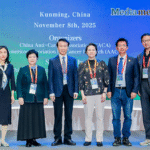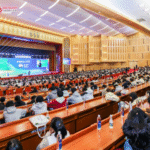
Editor’s Note: The 2025 China Conference on Holistic Integrative Oncology (CCHIO), jointly organized by the Chinese Anti-Cancer Association (CACA) and the Tengchong Scientist Forum Organizing Committee Office, and co-hosted by the World Association of Integrative Oncology (WAIO) and the China Academy of Integrative Medicine Development Strategy, was held in Kunming, Yunnan, from November 6–9, 2025.
To deeply explore global trends in cancer prevention and control and to establish a high-quality platform for international academic collaboration, the conference featured a series of “International Organization Sessions” co-organized by CACA and ten leading global oncology organizations.
Among them, the CACA–EACR Joint Session, hosted by CACA and the European Association for Cancer Research (EACR), successfully took place on November 8. Experts and scholars from China and multiple European countries gathered to discuss major topics including integrative oncology, advances in basic cancer research, and innovations in diagnostic and therapeutic strategies. The session fostered scientific exchange and strengthened China–Europe collaboration toward advancing global cancer control.

The CACA–EACR Joint Session was co-chaired by Academician Fan Jia, Vice President of the Chinese Anti-Cancer Association (CACA), and Academician René Bernards, former President of the European Association for Cancer Research (EACR). Professor Geng Meiyu from the Shanghai Institute of Materia Medica, Chinese Academy of Sciences, served as the Executive Chair.

△ Professor Geng Meiyu
The first scientific lecture of the session was delivered by Academician René Bernards, titled “Non-traditional Approaches to Cancer Therapy.” Bernards presented a set of unconventional—and even disruptive—therapeutic concepts that challenge the long-held belief that stronger oncogenic signaling leads to faster cancer cell growth. Instead, he proposed that cancer cells possess an optimal level of oncogenic signaling; when this level is exceeded, the resulting overactivation-induced stress actually suppresses cancer cell proliferation.
Bernards and his team have developed a corresponding therapeutic strategy: using PP2A inhibitors to push key oncogenic pathways—such as MEK and PI3K—into a state of hyperactivation and excessive cellular stress, and subsequently combining this with WEE1 inhibitors to effectively kill these overstressed cancer cells.
Under such conditions, cancer cells face a “adapt or die” pressure. To survive, they may be forced to actively down-regulate oncogenic signaling, shift toward a lower-grade phenotype, or even lose their tumor-forming ability altogether.
This form of “cancer cell domestication,” driving tumor evolution toward a less aggressive state, represents a promising new therapeutic paradigm that may open avenues for entirely novel anticancer treatments.

△ Professor René Bernards
Professor Ying Guoguang from Tianjin Medical University Cancer Institute and Hospital delivered a presentation titled “A New Strategy for Tumor ‘Integrative Lethality’.” Professor Ying emphasized that the greatest challenge in oncology is tumor recurrence, and the fundamental cause of recurrence lies in intratumoral heterogeneity—a tumor is not a homogeneous mass derived from a single cell, but rather a complex ecosystem composed of multiple malignant cell subtypes.
However, traditional drug-development strategies typically target only one subset of tumor cells. As a result, every targeted therapy inevitably leaves behind varying numbers of off-target tumor cells, which then become the seeds and root cause of recurrence.
Therefore, to truly eradicate a tumor, treatment must achieve comprehensive coverage of all malignant cell populations, resulting in what Professor Ying defines as “integrative lethality.”
In recent years, with the rise of single-cell technologies, the complexity of intratumoral heterogeneity has become increasingly apparent. Notably, Professor Ying’s group began studying tumor heterogeneity nearly two decades ago, initially proving the phenomenon through extensive clonal analyses across multiple cell lines.
Through a series of functional screens and mechanistic studies, the team ultimately identified, cloned, validated, and named a membrane-regulating gene—SOPRA, which plays a key role in enabling integrative lethality. Subsequently, they collaborated with the Tianjin Institute of Pharmaceutical Research to develop novel tumor integrative-lethality targeted agents.
This innovative strategy aims to destroy the “tumor fortress walls” rather than merely targeting the “guards,” overturning the traditional paradigm of pathway-specific drug targeting. The goal is to comprehensively inhibit:
- tumor-associated signaling pathways,
- genome stability and maintenance pathways,
- drug-resistance regulatory pathways,
thereby achieving a significant leap forward in tumor treatment outcomes.

△ Professor Ying Guoguang
Professor Arkaitz Carracedo from CIC bioGUNE (Spain) presented a report focusing on how metabolic alterations support prostate cancer aggressiveness. Using publicly available transcriptomic datasets, Carracedo’s team analyzed metabolic enzyme expression during prostate cancer progression and discovered that low expression of ASPA—the gene encoding aspartoacylase—is strongly associated with poor patient prognosis.
They further found that ASPA downregulation occurs specifically in tumor-associated fibroblasts, driven by TGF-β signaling released from cancer cells, which reprograms fibroblast function. Low ASPA expression impairs fibroblasts’ ability to metabolize N-acetylaspartate (NAA) produced by cancer cells. As a consequence, accumulated NAA mediates macrophage polarization toward the M2 phenotype within the tumor microenvironment, thereby promoting prostate cancer invasiveness.
Professor Carracedo concluded that targeting these metabolic alterations in fibroblasts offers an effective strategy to suppress prostate cancer aggressiveness.

△ Professor Arkaitz Carracedo
Professor Pan Jingxuan from the Zhongshan Ophthalmic Center of Sun Yat-sen University delivered a presentation titled “Drug Therapy Targeting Cancer Stem Cells.” Professor Pan emphasized that cancer stem cells (CSCs) are the core drivers of multiple malignant behaviors of tumors and are strongly associated with treatment resistance and relapse. Among CSCs, leukemia stem cells (LSCs) were the earliest to be identified, with chronic myeloid leukemia (CML) driven by the BCR-ABL fusion gene serving as an ideal model for CSC research.
Professor Pan’s team systematically elucidated the mechanisms maintaining LSC stemness on two major levels — basal transcription machinery and histone modifications.
- In 2021, they demonstrated that LSCs are highly dependent on the super-enhancer–associated gene XTP1s, identifying it as a promising therapeutic target.
- The team then delved deeper into protein arginine methyltransferases (PRMTs) in LSCs, revealing multiple novel vulnerabilities:
- PRMT7, highly expressed in LSCs, enhances stemness by rewiring glycine metabolism. Inhibiting PRMT7 leads to the accumulation of methylglycine, triggering LSC death.
- Another family member, PRMT1, directly drives transcription of RPL29, a key component of the large ribosomal subunit, thereby promoting the synthesis of stemness-associated proteins such as Myc and Bcl-2. This supports LSC survival and self-renewal.
These findings provide powerful new molecular targets for the development of therapeutics specifically aimed at eradicating LSCs.

△ Professor Pan Jingxuan
After a series of engaging discussions in which participating experts exchanged insights on each presentation and explored the potential applicability of these findings to broader tumor types and clinical contexts, Academician René Bernards, serving as the session chair, led the closing remarks.
Academician Bernards emphasized that cancer treatment remains an exceptionally complex global challenge—one that requires the joint efforts of leading researchers from China, Europe, the United States, and around the world. He expressed that continued collaboration through platforms like this CACA–EACR special session is essential for generating impactful scientific breakthroughs. Bernards concluded by expressing his hope that CACA and EACR will further strengthen their pragmatic cooperation in the future, ultimately bringing greater benefit to cancer patients in China, Europe, and across the globe.





